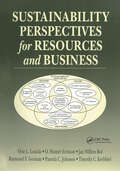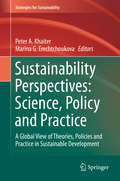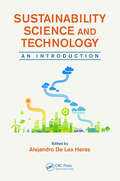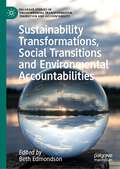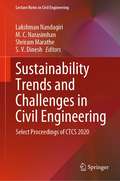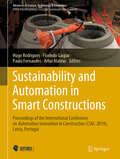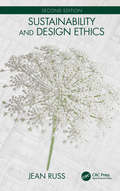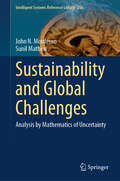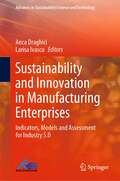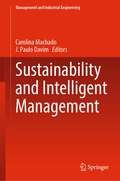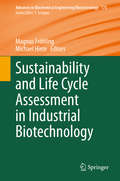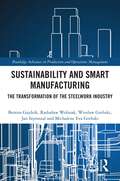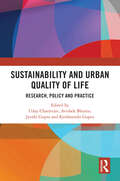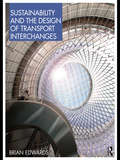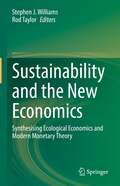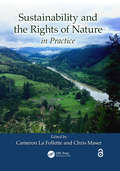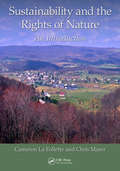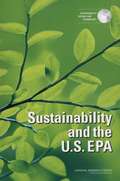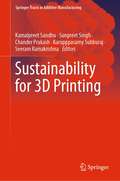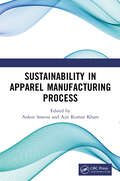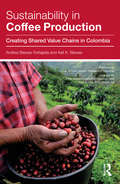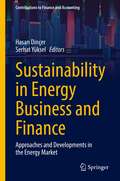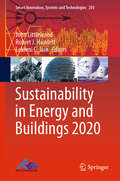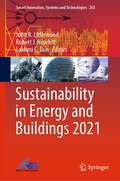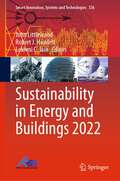- Table View
- List View
Sustainability Perspectives for Resources and Business
by Orie L. Loucks O. Homer Erekson Jan Willem Bol Raymond F. Gorman Pamela C. Johnson Timothy C. KrenbielMiami University in Oxford, Ohio offers a course entitled "Sustainability Perspectives," based on this text. The course was awarded "The Instructional Innovation Award" at the 1996 annual meeting of the Decision Sciences Institute, an association of Decision Science professionals headquartered at Georgia State University in Atlanta. The 1990's have seen the development of important new approaches to sustaining corporate development and protecting the environment. Corporations are beginning to realize their responsibilities for a healthy environment. Sustainable development is viewed as an integrated, ecological, economic, and social system in which both economic growth and quality-of-life improvements can occur in a unified system complementary to the maintenance of natural capital. Sustainability Perspectives for Resources and Businesses shows the reader that a sound understanding of the concepts involved in sustainable development is beneficial to businesses, natural resources, and the population in general.This textbook was written to help students and professionals involved in business, science, or engineering to understand the changes occurring in the workplace. It serves as a step toward understanding how business and science, as professional communities, are adapting to new information about risks to the environment. Various chapters are devoted to resources, values, and valuation systems. Each section develops principles such as resilience and integrity in the economy and the environment.
Sustainability Perspectives: A Global View of Theories, Policies and Practice in Sustainable Development (Strategies for Sustainability)
by Peter A. Khaiter Marina G. ErechtchoukovaThe book presents methodological and applied aspects of sustainability and sustainable management from different countries and regions around the globe. It discusses approaches to sustainability assessment, demonstrates how ideas of sustainability and sustainable management are incorporated into public policies and private actions at local and national levels. Authors focus on promoting greater sustainability in natural resource management, energy production and storage, housing design, industrial reorganization, coastal planning, land use, and business strategy, including sustainability indicators, environmental damages, and theoretical frameworks. Chapters reflect environmental, economic and social issues in sustainable development, challenges encountered, and lessons learned as well as solutions proposed.
Sustainability Science and Technology: An Introduction
by alejandro de las herasSustainability Science and Technology: An Introduction explains the root causes of global failures in natural and human systems, as well as the most readily available technological solutions. The book dispels risky scientific and technological ideas that further complicate the current environmental and socioeconomic predicaments. It also bridges ga
Sustainability Transformations, Social Transitions and Environmental Accountabilities (Palgrave Studies in Environmental Transformation, Transition and Accountability)
by Beth EdmondsonThis book draws upon diverse approaches and understandings of sustainability transformations, social transitions and environmental accountabilities. It presents case studies that highlight real-world consequences of changing ideas about how best to achieve effective and durable sustainability transformations and examines how environmental accountabilities and social transitions influence sustainability transformations. Each chapter provides insights regarding how new knowledge and perspectives matter for whether, when, and how people, governments, corporations and international organisations seek and pursue solutions to social-ecological challenges and sustainability dilemmas. It pays sustained attention to whether and how understandings and applications of accountability can improve international sustainability transformations. The chapters presented in this book consider some pressing questions concerning social transitions and environmental accountabilities: how can they contribute to sustainability transformations, how do they influence the scalability of sustainability transformations, and, how can such sustainability transformations become durable?
Sustainability Trends and Challenges in Civil Engineering: Select Proceedings of CTCS 2020 (Lecture Notes in Civil Engineering #162)
by M. C. Narasimhan S. V. Dinesh Shriram Marathe Lakshman NandagiriThis book presents the select proceedings of the International Conference on Civil Engineering Trends and Challenges for Sustainability (CTCS 2020). The chapters discuss emerging and latest research and advances in sustainability in different areas of civil engineering, which aim to provide solutions to sustainable development. The contents are broadly divided into the following categories: construction technology and building materials, structural engineering, transportation and geotechnical engineering, environmental and water resources engineering, and RS-GIS applications. This book will be of potential interest to beginners, researchers, and professionals working in the area of sustainable civil engineering and related fields.
Sustainability and Automation in Smart Constructions: Proceedings of the International Conference on Automation Innovation in Construction (CIAC-2019), Leiria, Portugal (Advances in Science, Technology & Innovation)
by Hugo Rodrigues Florindo Gaspar Paulo Fernandes Artur MateusThis book gathers outstanding papers presented at the Conference on Automation Innovation in Construction (CIAC-2019). In recent years, there have been significant transformations in the construction sector regarding production and the use of computers and automation to create smart and autonomous systems. At the same time, innovative construction materials and alternative technologies are crucial to overcoming the challenges currently facing the building materials industry. The book presents numerous examples of smart construction technologies, discusses the applications of new construction materials and technologies, and includes studies on recent trends in automation as applied to the construction sector.
Sustainability and Design Ethics
by Jean Russ<p>Sustainability as a concept remains just as challenging and important today as it was when the first edition of this book was published. The Second Edition of Sustainability and Design Ethics explores the ethical obligations of knowledgeable people such as design professionals, taking into consideration the numerous changes that have taken place in recent years. This book expands the growing discussion on the principles of sustainability to further include the role of businesses and governments and considers the general recognition that modern society has occurred at the expense of nature with significant social and environmental impacts. <p>Are there limits to the individual’s ethical obligation? How do such obligations change or adapt to a world of sustainable design? As the shift toward sustainability proceeds, designers’ ethical underpinnings will be confronted with a wider range of people and concerns whose interests must be weighed. The design professionals are likely to be among the lead in the shift toward sustainability because of the special knowledge and expertise provided to them by their education, experience, and distinctive position in society. The entire world of design is being reassessed and the guiding principles and ethics of design reflect this change. <p>New to the Second Edition: <p> <li>Expanded international scope that includes a comparison of professional organizations in the EU, Australia, Canada, Japan and China <li>Discusses how cultural differences between the West and China result in different underlying foundations for professional ethics <li>Revised analyses to reflect changes in regulatory and technical areas such as the inevitable rise of artificial intelligence in design <li>Updated arguments reflecting the need for sustainability and the designer's role and obligations <li>Updated references pertaining to the progress of sustainable design and development</li> <p>Sustainability and Design Ethics, Second Edition is an attempt to explore the ideas and principles that might contribute to the thinking of thoughtful design professionals. The emergence of "green" design discussed in this book is used to evidence progress, but also to demonstrate the degree to which more is needed.</p>
Sustainability and Global Challenges: Analysis by Mathematics of Uncertainty (Intelligent Systems Reference Library #256)
by John N. Mordeson Sunil MathewThis book focuses on the relationship between Artificial Intelligence (AI) and the Sustainable Development Goals (SDGs). One of the most important issues the world is facing is sustainability. All members of the United Nations adopted Agenda 2030 and the Sustainable Development Goals. Associated with the SDGs are many serious global problems. These problems include climate change, global poverty, global hunger, human trafficking, homelessness, biodiversity, extinction, and terrorism. The author’s purpose is to develop a textbook concerning the SDGs and how they relate to these problems. A recent issue has emerged. That is Artificial Intelligence. AI has tremendous potential to do both good and harm. The book is designed in such a way that it can be used as an undergraduate textbook on sustainability. Consequently, the mathematics involved is kept at a reasonable level. One of the author’s goals is to prepare the reader to further their study of global issues. In particular, to provide them the background needed to examine the three books in the Springer Series Studies in Systems, Decision and Control, volumes 299, 353, and 391. Exercises are provided in the text as well as an instructor's manual. Some topics examined in the book include country achievement of the SDGs, the relationship between human trafficking and the SDGs, climate change, and global problems mentioned above.
Sustainability and Innovation in Manufacturing Enterprises: Indicators, Models and Assessment for Industry 5.0 (Advances in Sustainability Science and Technology)
by Anca Draghici Larisa IvascuThis book informs and educates readers about sustainable development management, approaches and applications in manufacturing processes and presents the trends to the next economic and social paradigm: the Industry 5.0 and Society 5.0. Educational aspects, case studies from various companies, together with the analysis and synthesis of the literature and empirical experiences, define the content of the eleven chapters. Thus, this material could be considered as a starting point and foundation for researchers and practitioners interested in the present state and the evolution of the manufacturing systems. The book offers various points of view regarding the actual digital transformation of the manufacturing system.
Sustainability and Intelligent Management (Management and Industrial Engineering)
by J. Paulo Davim Carolina MachadoThis book presents contributions of intelligent management theories and models for a more effective management of sustainable business practices in competitive, profitable and socially responsible organizations. It communicates the latest developments and thinking on the sustainability and intelligent management subjects worldwide, increasing the knowledge and effectiveness of all those involved in these areas whether in the profit or non-profit sectors or in the public or private sectors.
Sustainability and Life Cycle Assessment in Industrial Biotechnology (Advances in Biochemical Engineering/Biotechnology #173)
by Magnus Fröhling Michael HieteThis book reviews the assessment of industrial biotechnology products and processes from a sustainable perspective. Industrial Biotechnology is a comparably young field which comes along with high expectations with regard to sustainability issues. These stem from the promise of reducing greenhouse gas emissions and replacing fossil resources in the near or later future and using green technology, i.e. more environmentally friendly technologies. The intended economic, ecological and social benefits, however, need to be proven, resulting in a variety of challenges, both from a methodological and application point of view. In this book, specific assessment and application topics of industrial biotechnology are addressed, highlighting challenges and solutions for both developers and users of assessment methods. In twelve chapters, experts in their particular fields define the scope, characterize industrial biotechnology and show in their contributions the state of the art, challenges and prospects of assessing industrial biotechnology products and processes.The chapter 'Societal and Ethical Aspects of Industrial Biotechnology' of this book is available open access under a CC BY 4.0 license at link.springer.com
Sustainability and Smart Manufacturing: The Transformation of the Steelwork Industry (Routledge Advances in Production and Operations Management)
by Radosław Wolniak Bożena Gajdzik Wieslaw Grebski Jan Szymszal Michalene Eva GrebskiThis book discusses three key aspects of business operations: sustainability, human factors, and smart manufacturing, which make up modern business. The authors share their experiences in the transformation of enterprises to Industry 4.0/5.0 and the sustainability of steel production, as well as the reorganization of human factors using the example of the steel sector. The steel industry is covered both from a global perspective (key producers in the global steel market), as well as from a local and sectoral perspective (the companies that make up the sector of metal and metal product producers, using Poland as an example).This insightful book discusses how the steel industry can develop intelligent solutions to enhance sustainable performance and the challenges they must overcome, including policy and regulation. Case studies evaluate how steel companies are investing in new technologies that meet environmental requirements but also human resource development to enhance digital skills and competencies of the workforce.The book will find an audience across disciplines but be of particular value to scholars of industrial, operations, and technology management.
Sustainability and Urban Quality of Life: Research, Policy and Practice
by Uday Chatterjee, Avishek Bhunia, Jyothi Gupta and Krishnendu GuptaThis book conceptualizes and synthesizes worldwide research on the quality of urban life. It looks at quality of life within urban cities analysing amenities, infrastructure and assets while also bringing in the discourse around scarcity, disparity, accessibility, sustainability, equity, and well-being.Organized into four major parts, the book reflects on the interconnections between theories and practice and through a multi-disciplinary approach focuses on the aspects of urban environment and planning that makes cities inclusive, safe, resilient, smart, and sustainable. This book highlights the enormous strain on urban areas due to severe scarcity of civic systems and provides an in-depth look into urban concerns and pressing challenges from a global perspective, as well as many planning approaches to solving these problems.This book will be useful to students, researchers and teachers working in the field of urban studies, remote sensing and GIS, planning and sustainability, sustainable development, urban geography, development geography and population geography. This book would also be an invaluable companion to thought leaders, policy makers and industry and other professionals working in the field of urban planning and human development.
Sustainability and the Design of Transport Interchanges
by Brian EdwardsThe interchange is a new form of transport building which integrates into a single whole various modes of public transport, putting the passenger first (rather than the infrastructure). This book presents design principles for transport interchanges and offers analysis of best practice in the UK and abroad. The author demonstrates how this complex new building type integrates with the city, on the one hand, and with different types of transport on the other. In this integration design in both plan and section are important, as is urban and landscape design. The idea of ‘interchange’ is increasingly relevant as town planners, engineers and architects address the question of sustainable development with its emphasis on energy efficiency, social cohesion, access for the elderly, and urban regeneration.
Sustainability and the New Economics: Synthesising Ecological Economics and Modern Monetary Theory
by Rod Taylor Stephen J. WilliamsThis multidisciplinary book provides new insights and hope for sustainable prosperity given recent developments in economics – but only if swift and strong actions consistent with Earth’s biophysical limits and principles of justice are universally taken. It is one thing to put limits on resource throughput and waste generation to conform with the ecosphere’s biocapacity. It is another thing to efficiently allocate a sustainable rate of resource throughput and ensure it is equitably distributed in the form of final goods and services. While the separate but interdependent decisions regarding throughput, distribution, and allocation are the essence of ecological economics, dealing with them in a world that needs to cure its growth addiction requires a realistic understanding of macroeconomics and the fiscal capacity of currency-issuing central governments. Sustainable prosperity demands that we harness this understanding to carefully regulate the rate of resource throughput and manipulate macroeconomic outcomes to facilitate human flourishing. The book begins by outlining humanity’s current predicament of gross ecological overshoot and laments the half-century of missed opportunities since The Limits to Growth (1972). What was once economic growth has become, in many high-income countries, uneconomic growth (additional costs exceeding additional benefits), which is no longer advancing wellbeing. Meanwhile, low-income nations need a dose of efficient and equitable growth to escape poverty while protecting their environments and the global commons. The book argues for a synthesis of our increasing knowledge of the ecosphere’s limited carrying capacity and the power of governments to harness, transform, and distribute resources for the common good. Central to this synthesis must be a correct understanding of the difference between financial constraints and real resource constraints. While the latter apply to everyone, the former do not apply to currency-issuing central governments, which have much more capacity for corrective action than mainstream thinking perceives. The book joins the growing chorus of authoritative voices calling for a complete overhaul of the dominant economic system. We conclude with policy recommendations based on a new economics that, if implemented, would come close to guaranteeing a sustainable and prosperous future. Upon reading this book, at least one thing should be crystal clear: business as usual is not a viable option.
Sustainability and the Rights of Nature in Practise (Social Environmental Sustainability)
by Chris Maser Cameron La FolletteSustainability and the Rights of Nature in Practice is the much-needed complementary volume to Sustainability and the Rights of Nature: An Introduction (CRC Press, May 2017). The first book laid out the international precursors for the Rights of Nature doctrine and described the changes required to create a Rights of Nature framework that supports Nature in a sustainable relationship rather than as an exploited resource. This follow-up work provides practitioners from diverse cultures around the world an opportunity to describe their own projects, successes, and challenges in moving toward a legal personhood for Nature. It includes contributions from Nepal, New Zealand, Canadian Native American cultures, Kiribati, the United States and Scotland, amongst others, by practitioners working on projects that can be integrated into a Rights of Nature framework. The authors also tackle required changes to shift the paradigm, such as thinking of Nature in a sacred manner, reorienting Nature’s rights and human rights, the conceptualization of restoration, and the removal of large-scale energy infrastructure. Curated by experts in the field, this expansive collection of papers will prove invaluable to a wide array of policymakers and administrators, environmental advocates and conservation groups, tribal land managers, and communities seeking to create or maintain a sustainable relationship with Nature. Features: Addresses existing projects that are successfully implementing a Rights of Nature legal framework, including the difference it makes in practice Presents the voices of practitioners not often recognized who are working in innovative ways towards sustainability and the need to grant a voice to Nature in human decision-making Explores new ideas from the insights of a diverse range of cultures on how to grant legal personhood to Nature, restrain damaging human activity, create true sustainability, and glimpse how a Rights of Nature paradigm can work in different societies Details the potential pitfalls to Rights of Nature governance and land use decisions from people doing the work, as well as their solutions Discusses the basic human needs for shelter, food, and community in entirely new ways: in relationship with Nature, rather than in conquest of it
Sustainability and the Rights of Nature: An Introduction (Social Environmental Sustainability)
by Chris Maser Cameron La FolletteSustainability and the Rights of Nature: An Introduction is a much-needed guide that addresses the exciting and significant paradigm shift to the Rights of Nature, as it is occurring both in the United States and internationally in the fields of environmental law and environmental sustainability. This shift advocates building a relationship of integrity and reciprocity with the planet by placing Nature in the forefront of our rights-based legal systems. The authors discuss means of achieving this by laying out Nature’s Laws of Reciprocity and providing a roadmap of the strategies and directions needed to create a Rights of Nature-oriented legal system that will shape and maintain human activities in an environmentally sustainable manner. This work is enriched with an array of unique and relevant points of reference such as the feudal notions of obligation, principles of traditional indigenous cultivation, the Pope Francis Encyclical on the environment, and the new Rights of Nature-based legal systems of Ecuador and Bolivia that can serve as prototypes for the United States and other countries around the world to help ensure a future of environmental sustainability for all living systems.
Sustainability and the U.S. EPA
by The National Academy of SciencesThe National Research Council convened a Committee on Incorporating Sustainability in the US Environmental Protection Agency, to provide an operational framework for this integration as one of the drivers within the EPA's regulatory responsibility, as well as to address how the existing framework rooted in risk assessment/risk management can be integrated and identify the scientific and analytical tools and expertise needed to support it. Following a brief history of sustainability in the US and internationally, the proposed framework is presented, as are the processes and tools and discussion of how the EPA decision-making process can be integrated, cultural change management at the agency, and the relevance and utility of sustainability considerations in the EPA's accomplishment of its mission, as well as examples of successful sustainability initiatives. There is no index. Annotation ©2011 Book News, Inc. , Portland, OR (booknews. com)
Sustainability for 3D Printing (Springer Tracts in Additive Manufacturing)
by Seeram Ramakrishna Chander Prakash Sunpreet Singh Karupppasamy Subburaj Kamalpreet SandhuWith advancement in modern technology human life span in 21st century has significantly improved as compared to past centuries. Indeed, the manufacturing and household wastes have also boosted in the same era, presenting a hazardous condition to the various living beings. However, through smart methodologies, it can be possible to recycle/reuse of the different types of wastes as a feedstock convenient for specialized manufacturing technologies, such as 3D printing. This means that through proper facilities the waste can be used as the raw material for the printing technologies with characteristic at par with the virgin feedstock. Furthermore, producing the feedstock using waste materials will help to reduce the cost of the processing material, productivity and eco-friendliness of this manufacturing technology. This book will cover a boarder aspect of such efforts wherein various applications and state of art solutions will be discussed in a comprehensive way. This book will be much interest for academics, research and entrepreneur who are working in the field materials science, 3D printing, and manufacturing because of its coverage of state of art solution in the field of commercial, industrial and healthcare products.
Sustainability in Apparel Manufacturing Process
by Ankur Saxena Ajit Kumar KhareWith the apparel industry contributing to almost 33 percent of the country’s exports, textile and garment manufacturing plays a vital role in the country’ economy.This book records the existing and emerging sustainability standards in the apparel industry and outlines the supply chain of the manufacturing process. It covers the best practices, industry norms, sustainability evaluation procedures, marketing strategies, and consumer perceptions. It also details the challenges faced by apparel manufacturing factories in adopting sustainable manufacturing techniques and finally presents a theoretical framework for sustainable manufacturing in Indian apparel manufacturing industry.Print edition not for sale in South Asia (India, Sri Lanka, Nepal, Bangladesh, Pakistan or Bhutan)
Sustainability in Coffee Production: Creating Shared Value Chains in Colombia
by Asit K. Biswas Andrea Biswas-TortajadaCoffee, as a commodity and through its global value chains, is the focus of much interest to achieve fair trade and equitable outcomes for producers, processors and consumers. It has iconic cultural and economic significance for Colombia, which is one of the world's major coffee producers for the global market. This book examines sustainable coffee production in Colombia, specifically the initiatives of Nestlé to create shared value. It describes the transformation of the coffee landscape by the development of economically, socially and environmentally viable and dedicated supply chains. Suppliers have been encouraged to shift production and quality paradigms, in order to develop long-term and sustainable strategies for higher value and premium quality products. This has been partially achieved by establishing a robust partnership with the Coffee Growers Federation and other public, private and social actors, thereby taking control of the institutional architecture and knowledge base that exists in the country. The book provides an important lesson of corporate social responsibility and the creation of shared value for the benefit of farmers, corporations and consumers.
Sustainability in Energy Business and Finance: Approaches and Developments in the Energy Market (Contributions to Finance and Accounting)
by Hasan Dinçer Serhat YükselThis edited volume seeks to identify the sustainability issues currently affecting the energy business and finance. For this purpose, a broad range of perspectives on sustainability issues in the energy business and finance are taken into consideration in the context of renewable business projects. In turn, several novel strategies from the energy business and finance are illustrated with regard to sustainable organizational factors, technological infrastructure, financial facilities, economic development, and investment potential. Comparing and contrasting different sustainability perspectives can help to develop the most appropriate and successful business strategies for the sustainable energy business and finance. This book presents multidimensional analyses of sustainability issues with regard to renewable energy projects and identifies the most promising strategies, as well as efficient market conditions for the energy business.
Sustainability in Energy and Buildings 2020 (Smart Innovation, Systems and Technologies #203)
by Lakhmi C. Jain Robert J. Howlett John LittlewoodThis book contains the proceedings of the 12th KES International Conference on Sustainability and Energy in Buildings 2020 (SEB20) held in Split, Croatia, during 24–26 June 2020 organized by KES International. SEB20 invited contributions on a range of topics related to sustainable buildings and explored innovative themes regarding sustainable energy systems. The aim of the conference is to bring together researchers, and government and industry professionals to discuss the future of energy in buildings, neighbourhoods and cities from a theoretical, practical, implementation and simulation perspective. The conference formed an exciting chance to present, interact and learn about the latest research and practical developments on the subject. The conference attracted submissions from around the world. Submissions for the Full-Paper Track were subjected to a blind peer-review process. Only the best of these were selected for presentation at the conference and publication in these proceedings. It is intended that this book provides a useful and informative snapshot of recent research developments in the important and vibrant area of sustainability in energy and buildings.
Sustainability in Energy and Buildings 2021 (Smart Innovation, Systems and Technologies #263)
by Lakhmi C. Jain Robert J. Howlett John R. LittlewoodThis book contains the proceedings of the 13th KES International Conference on Sustainability and Energy in Buildings 2021 (SEB2021) held in Split, Croatia, during 15–17 September 2021 organized by KES International. SEB21 invited contributions on a range of topics related to sustainable buildings and explored innovative themes regarding sustainable energy systems. The conference formed an exciting chance to present, interact and learn about the latest research and practical developments on the subject. The conference attracted submissions from around the world. Submissions for the Full-Paper Track were subjected to a blind peer-review process. Only the best of these were selected for presentation at the conference and publication in these proceedings. It is intended that this book provides a useful and informative snapshot of recent research developments in the important and vibrant area of sustainability in energy and buildings.
Sustainability in Energy and Buildings 2022 (Smart Innovation, Systems and Technologies #336)
by Lakhmi C. Jain Robert J. Howlett John LittlewoodThis book contains the proceedings of the 14th KES International Conference on Sustainability and Energy in Buildings 2021 (SEB2022) held in Split, Croatia, during September 14–16, 2022, organized by KES International. SEB22 invited contributions on a range of topics related to sustainable buildings and explored innovative themes regarding sustainable energy systems. The conference formed an exciting chance to present, interact and learn about the latest research and practical developments on the subject. The conference attracted submissions from around the world. Submissions for the full-paper track were subjected to a blind peer-reviewed process. Only the best of these were selected for presentation at the conference and publication in these proceedings. It is intended that this book provides a useful and informative snapshot of recent research developments in the important and vibrant area of sustainability in energy and buildings.
